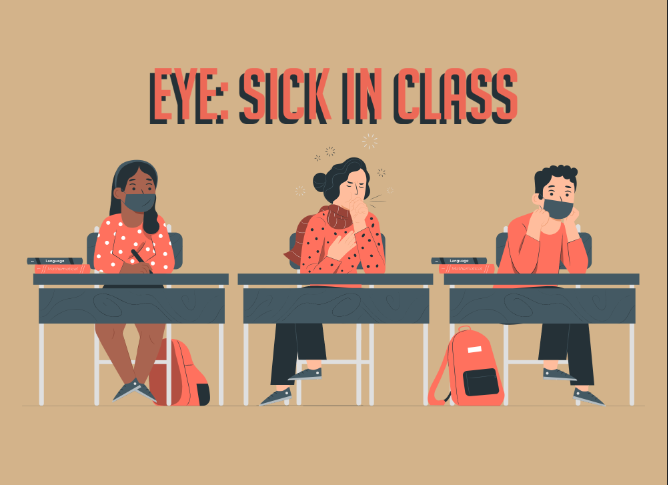Eye of the Editors: Attending school sick
Opinion: The administration should take steps to correct policies regarding sick leave and absent work that promote unhealthy competition between students and create a toxic work environment.
It’s no secret that Diamond Bar High School students are highly competitive and willing to sacrifice almost anything to succeed. However, one of the sacrifices that often goes undetected or ignored by administration is attending school while sick.
Unintentionally, both administration and teachers have grown accustomed to students who attend classes coughing or sneezing. Only with the pandemic have their mindsets begun to change. Now, at least for the few students allowed on campus, the administration must take precautionary measures that require ill students to stay home. These new regulations are the district’s strictest to date, and for good reason.
However, if such policies are to be maintained upon returning to campus, as they should be for the sake of everyone’s health, the school must address the issues that convince students to attend school sick in the first place.
With rigorous courses and schedules packed with AP courses, it’s safe to say that the DBHS student body is among the most cut-throat in the area. Missing even one day means risking falling behind all the other overachieving students aiming to be the top of every class.
Yet, this toxic competitiveness isn’t something the administration can change. What they can do, at least to start, is limit the academic impact of missing a few days of school. While it’s impossible to make a seamless transition after forgoing so many days of class, certain changes could, at least, make students feel more comfortable missing school while sick.
Teachers’ absentee work policies are the most important point to address. Most teachers, especially those teaching AP and Honor-level courses, give students the exact number of days they were sick to complete all the missing work. That one, two or even three-day workload includes notes, homework and lessons, all of which must be completed independently and with limited guidance from teachers. Worse still, this load is on top of the work they are already assigned on a day-to-day basis.
Apart from homework and lessons, students miss out on extra credit and lab work that, either, can’t be made up or has a difficult “equivalent assignment.” In fact, such overbearing policies are illegal. Teachers in California are legally required to provide an assignment of equal difficulty and worth the exact same number of points to students who are absent. Thus, not only do some DBHS teachers unknowingly break the regulation, they also limit the opportunities for students who are sick. Students choose not speak out on it either as they fear the possible repercussions they’ll receive from teachers, a fear that works all too well for the competitive DBHS student body.
All of these opportunities students may miss force them to decide between their health and academic success, a choice no student should be forced to make.
However, if COVID-19 has taught us anything, it’s that getting a roughly equivalent education from home is possible. Just as teachers have done during distance learning, materials and information presented during classes can be made remotely accessible. Whether that means posting notes online, recording lectures or making most assignments due online, increasing accessibility across the board ensures that students have easy access to schoolwork.
It’s important to note, however, that even if lessons are made accessible online, some students need to rest to get better or may be too ill to work. As such, another necessary addition is to create a district-wide policy that extends grace periods for absent work. Those extra days of cushion should give students ample time to complete their daily assignments as well as any work they may have missed while sick.
To ensure the health and academic success of DBHS students, the administration must start by both creating and enforcing such changes. By establishing mandatory, district-wide policies, students will no longer need to worry about their education while they’re sick; a fear that should have never been there to start with.
Your donation will support the student journalists of Diamond Bar High School. Your contribution will allow us to purchase equipment and cover our annual website hosting costs.









